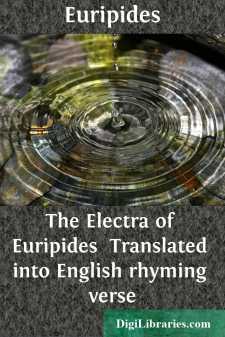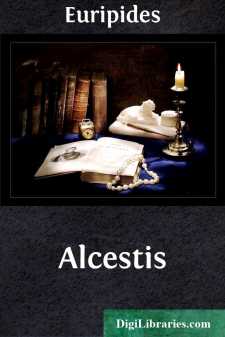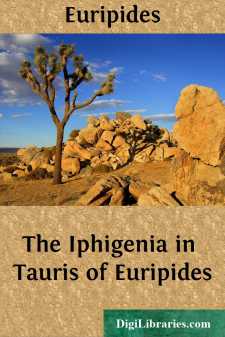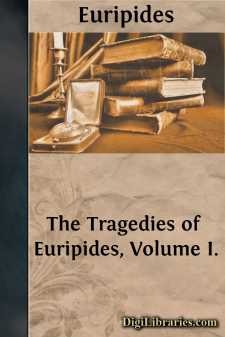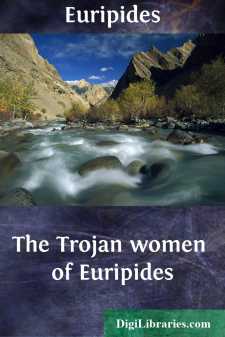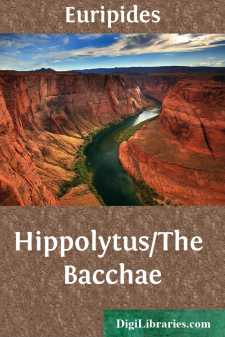Categories
- Antiques & Collectibles 13
- Architecture 36
- Art 48
- Bibles 22
- Biography & Autobiography 813
- Body, Mind & Spirit 142
- Business & Economics 28
- Children's Books 17
- Children's Fiction 14
- Computers 4
- Cooking 94
- Crafts & Hobbies 4
- Drama 346
- Education 46
- Family & Relationships 57
- Fiction 11829
- Games 19
- Gardening 17
- Health & Fitness 34
- History 1377
- House & Home 1
- Humor 147
- Juvenile Fiction 1873
- Juvenile Nonfiction 202
- Language Arts & Disciplines 88
- Law 16
- Literary Collections 686
- Literary Criticism 179
- Mathematics 13
- Medical 41
- Music 40
- Nature 179
- Non-Classifiable 1768
- Performing Arts 7
- Periodicals 1453
- Philosophy 64
- Photography 2
- Poetry 896
- Political Science 203
- Psychology 42
- Reference 154
- Religion 513
- Science 126
- Self-Help 84
- Social Science 81
- Sports & Recreation 34
- Study Aids 3
- Technology & Engineering 59
- Transportation 23
- Travel 463
- True Crime 29
The Electra of Euripides Translated into English rhyming verse
by: Euripides
Categories:
Description:
Excerpt
Introduction[1]
The Electra of Euripides has the distinction of being, perhaps, the best abused, and, one might add, not the best understood, of ancient tragedies. "A singular monument of poetical, or rather unpoetical perversity;" "the very worst of all his pieces;" are, for instance, the phrases applied to it by Schlegel. Considering that he judged it by the standards of conventional classicism, he could scarcely have arrived at any different conclusion. For it is essentially, and perhaps consciously, a protest against those standards. So, indeed, is the tragedy of The Trojan Women; but on very different lines. The Electra has none of the imaginative splendour, the vastness, the intense poetry, of that wonderful work. It is a close-knit, powerful, well-constructed play, as realistic as the tragic conventions will allow, intellectual and rebellious. Its psychology reminds one of Browning, or even of Ibsen.
To a fifth-century Greek all history came in the form of legend; and no less than three extant tragedies, Aeschylus' Libation-Bearers (456 B.C.), Euripides' Electra (413 B.C.), and Sophocles' Electra (date unknown: but perhaps the latest of the three) are based on the particular piece of legend or history now before us. It narrates how the son and daughter of the murdered king, Agamemnon, slew, in due course of revenge, and by Apollo's express command, their guilty mother and her paramour.
Homer had long since told the story, as he tells so many, simply and grandly, without moral questioning and without intensity. The atmosphere is heroic. It is all a blood-feud between chieftains, in which Orestes, after seven years, succeeds in slaying his foe Aegisthus, who had killed his father. He probably killed his mother also; but we are not directly told so. His sister may have helped him, and he may possibly have gone mad afterwards; but these painful issues are kept determinedly in the shade.
Somewhat surprisingly, Sophocles, although by his time Electra and Clytemnestra had become leading figures in the story and the mother-murder its essential climax, preserves a very similar atmosphere. His tragedy is enthusiastically praised by Schlegel for "the celestial purity, the fresh breath of life and youth, that is diffused over so dreadful a subject." "Everything dark and ominous is avoided. Orestes enjoys the fulness of health and strength. He is beset neither with doubts nor stings of conscience." Especially laudable is the "austerity" with which Aegisthus is driven into the house to receive, according to Schlegel, a specially ignominious death!
This combination of matricide and good spirits, however satisfactory to the determined classicist, will probably strike most intelligent readers as a little curious, and even, if one may use the word at all in connection with so powerful a play, undramatic. It becomes intelligible as soon as we observe that Sophocles was deliberately seeking what he regarded as an archaic or "Homeric" style (cf. Jebb, Introd. p. xli.); and this archaism, in its turn, seems to me best explained as a conscious reaction against Euripides' searching and unconventional treatment of the same subject (cf....


